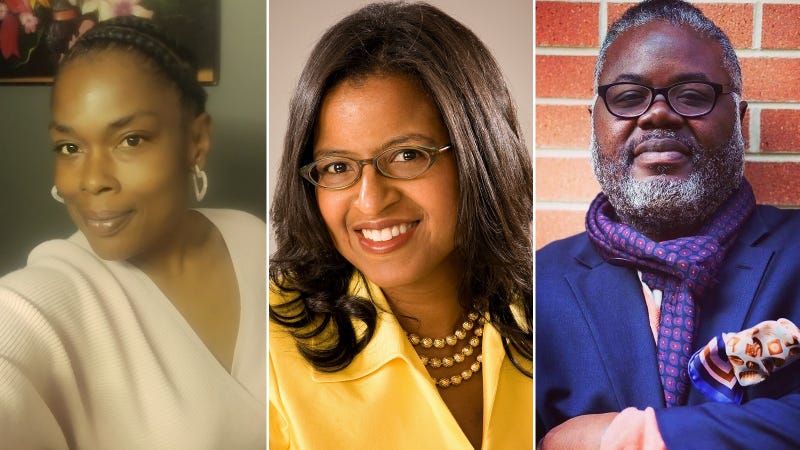
PHILADELPHIA (KYW Newsradio) — “If you have a problem figuring out if you are for me or for Trump, then you ain’t Black!”
Many people remember this statement from 2020 that then-candidate Joe Biden made to a Black media personality. It didn’t go over well, especially for many Black conservatives.
"Just to make that [statement] is an insult to the history of our people here, and you know we're not monolithic. We're very diverse in every aspect," said Randy Robinson of Philadelphia, the president and CEO of political consulting group RRR Consulting LLC. He has been a Republican for over 25 years after he switched parties in 1995.
"I felt like the Republican Party in a conservative perspective on governing was the best fit for a capitalist society, and so I decided that I would change."
Robinson is an outlier. A recent Pew study found just 10% of Black voters identify as Republican. Starting with the Great Depression and continuing with the civil rights movement, African Americans have overwhelmingly favored Democrats.
Today, Robinson and other GOP party members of color often find themselves having to defend their so-called “Blackness” because of their party affiliation.
But it doesn’t bother Adrienne Baker of Philadelphia. The lifelong Republican is a former ward chair for the Philly GOP.
"I was raised one, and I'm going to die one, and I love it. I love being a Republican. I love being a Black Republican,” said Baker.
“I get all the backlash and all that, but it’s just because they don't understand. So instead of looking within and working on themselves to make themselves great, they bash us.”
Baker also says her “wokeness” comes into question because she’s a Republican.
"I'm a conservative, I'm a Republican, but I'm Black first. Before I was a mom or wife and all that, I was Black first,” said Baker. “Although I am a Black conservative, I'm still vested in the community."
Farrah Jimenez, the president and CEO of the Philadelphia Education Fund, said people are often shocked to learn she’s a lifelong conservative.
"The belief system is that there's no compassion within the Republican Party and what I often will say is, there's just a different approach to the solutions,” said Jimenez. “Both parties, because we're human, we have a lot of compassion for people who are struggling. What we believe to be the solution to that struggle … it can be quite different."
Her conservative Christian parents immigrated from Cuba and came to the U.S. to escape communism and seek better opportunities. She said despite having dark skin, they were embraced, and that left an impression.
"The reason I stayed [Republican] is because those values are consistently true for me,” Jimenez said. “They haven't really shifted. The way that I look at the world is informed by my faith. It's informed by my parents' struggle.”
All three expressed their desire to improve the lives of people of color, but question the effectiveness of Democrats doing so when the Black vote is all but guaranteed.
"If an elected official just takes it for granted that by being a Democrat they are entitled to 100% of African American votes, then what obligations do they have to actually follow through with real programs that lift up the community?" Jimenez questioned.
Robinson agrees.
"I qualify it as an investment in return, and as we look at where our voting investment has been in the party in urban capital in 50 years, I just don't see a return on that investment," according to Robinson.
When Donald Trump and the MAGA movement came to power, it fractured the Black Republican community. Baker voted for him twice despite the heat she received from friends and family.
"He's a no-excuses type of guy, he speaks his mind. He loves America and he really wanted the best for us. I know he might have gone about it the wrong way at times, but I believe he really meant well," Baker said.
Robinson, however, says he couldn’t vote for Trump, in part, because of the support from white supremacists.
"The fact of the matter is that not only would he not distance himself from that, but he almost embraced it and almost emboldened it. It was very problematic for me to support that level of candidate," said Robinson.
Meanwhile, Jimenez admits that Trump is not always the best at articulating a point that is balanced and inviting for people of diverse perspectives. She did note, however, that African Americans voted to support him in higher numbers in 2020.
"They did see that we didn't have any wars, that we were seeing an improved economy, that unemployment rates had fallen, and this is even in the midst of COVID," she said.
The backlash doesn’t only come from fellow African Americans.
Robinson says he tends to get the side eye from white Democrats when he shows up in spaces where the fight for equality and civil rights takes center stage.
"It’s like you're the slave on the plantation that learned to read and you're reading out loud. They’re like, ‘What are you doing?’ You are seen as being a threat to the establishment, and in that regard, I love being a threat." Robinson quipped.
Party affiliation, he says, has nothing to do with personal identity. He doesn't view his “Blackness” through the lens of a Republican, but rather through the lens of a Black man who happens to be a registered Republican.
Jimenez, meanwhile, said folks should ponder what either party has done to move the needle for communities of color, and take that to the polls.






